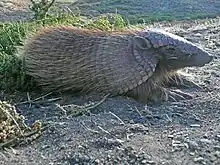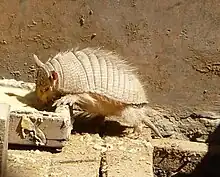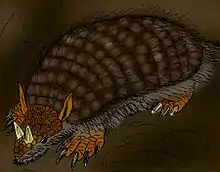Chaetophractus
Chaetophractus is a small genus of armadillos in the family Chlamyphoridae. It contains the following three species:
| Image | Scientific name | Common Name | Distribution |
|---|---|---|---|
 | Chaetophractus vellerosus | Screaming hairy armadillo | Central and southern parts of South America |
 | Chaetophractus villosus | Big hairy armadillo | The Pampas and Patagonia as far south as Santa Cruz, Argentina and Magallanes, Chile |
 | Chaetophractus nationi | Andean hairy armadillo | Bolivia, in the region of the Puna; the departments of Oruro, La Paz, and Cochabamba, Bolivia and northern Chile |
| Chaetophractus[1] | |
|---|---|
.JPG.webp) | |
| Big hairy armadillo (C. villosus) | |
| Scientific classification | |
| Domain: | Eukaryota |
| Kingdom: | Animalia |
| Phylum: | Chordata |
| Class: | Mammalia |
| Order: | Cingulata |
| Family: | Chlamyphoridae |
| Subfamily: | Euphractinae |
| Genus: | Chaetophractus Fitzinger, 1871 |
| Type species | |
| Dasypus villosus Desmarest, 1804 | |
| Species | |
Members of the genus are endemic to the continent of South America. They are found in the central and southern countries such as Argentina, Bolivia, Chile, and Paraguay.
Chaetophractus nationi is probably a junior synonym of Chaetophractus vellerosus and the genus Chatophractus may be paraphyletic.[2][3]
References
- Gardner, A.L. (2005). "Order Cingulata". In Wilson, D.E.; Reeder, D.M (eds.). Mammal Species of the World: A Taxonomic and Geographic Reference (3rd ed.). Johns Hopkins University Press. p. 96. ISBN 978-0-8018-8221-0. OCLC 62265494.
- Abba, Agustín M.; Cassini, Guillermo H.; Valverde, Guido; Tilak, Marie-Ka; Vizcaíno, Sergio F.; Superina, Mariella; Delsuc, Frédéric (2015-08-03). "Systematics of hairy armadillos and the taxonomic status of the Andean hairy armadillo (Chaetophractus nationi)". Journal of Mammalogy. 96 (4): 673–689. doi:10.1093/jmammal/gyv082. ISSN 0022-2372.
- Gibb, Gillian C.; Condamine, Fabien L.; Kuch, Melanie; Enk, Jacob; Moraes-Barros, Nadia; Superina, Mariella; Poinar, Hendrik N.; Delsuc, Frédéric (2016-03-01). "Shotgun Mitogenomics Provides a Reference Phylogenetic Framework and Timescale for Living Xenarthrans". Molecular Biology and Evolution. 33 (3): 621–642. doi:10.1093/molbev/msv250. ISSN 0737-4038. PMC 4760074. PMID 26556496.
This article is issued from Wikipedia. The text is licensed under Creative Commons - Attribution - Sharealike. Additional terms may apply for the media files.


